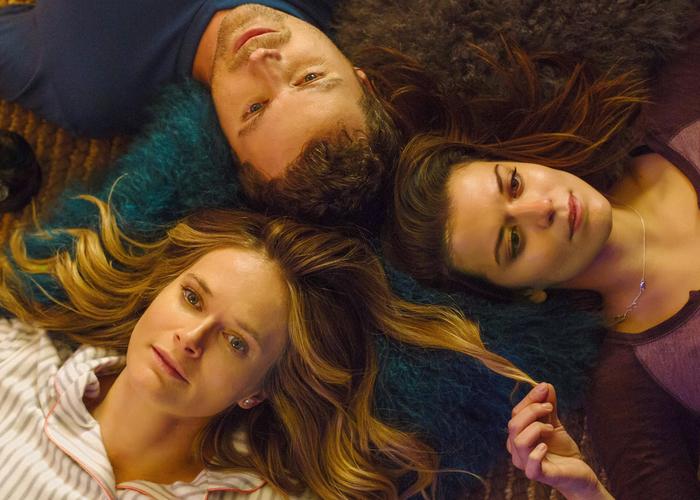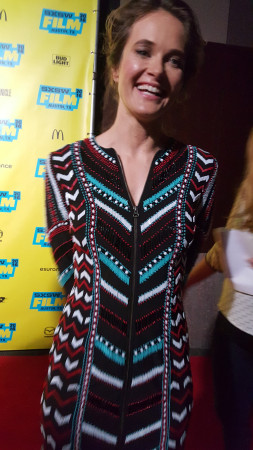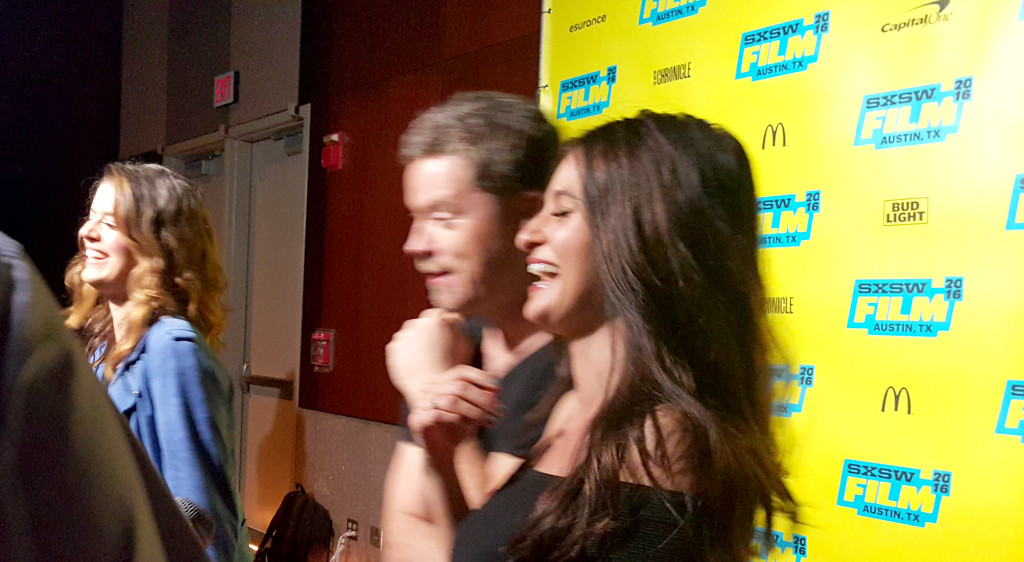“Be careful what you wish for,” declared Greg Poehler during the SXSW audience Q&A for “You Me Her,” the new “polyromantic” sitcom which premieres today on DirecTV’s Audience Network.

He was describing the reaction of Jack, the character he plays in the show, to discovering that his wife is bisexual. Jack’s confusion is far from the stereotypical “whoa! two hot chicks together!” response we’ve come to expect from straight guys in the media.
But he could also be describing my reaction to the news that a sitcom centered around polyamory was coming to the airwaves. My trepidation was compounded by the fact that there seemed to be very little information on the show online (it doesn’t help that The Hollywood Reporter called it “a sugar daddy comedy” in July) and even further when the show’s publicity team seemed reluctant to grant me access to their talent at SXSW.
I think most of us who have explored nonmonogamy have experienced a few moments of eye-rolling frustration at the TV, as yet another love triangle unfolds in one of our favorite programs. One of the most recent instances I can recall is the Margaret-Mordecai-CJ love triangle on the cartoon “Regular Show.” I groan inwardly every time this good-natured toon, normally about the supernatural mishaps of two stoners that work at a park, gets derailed by another bitter conflict over who gets to date the slacker bluebird that makes up half of the main duo.
Why can’t I see relationships like mine on TV? I wonder, in moments like those. Well, be careful what you wish for …
I attended the premiere of the first two episodes and, if you’re already annoyed at the length of this intro and planning to skip to the good parts, I’ll give you the quick version:
“You Me Her” doesn’t get everything right, but it represents an important “baby step” toward seeing alternative relationships and ethical non-monogamy represented on TV.
If you’re concerned about spoilers, I’ve mostly contained them to the next section, and tried to keep them to a minimum after that.

The basics: Izzy meets Jack & Emma
Jack and Emma (Rachel Blanchard), a cisgendered, upper middle class white couple living in a suburban Portland neighborhood, stopped having sex after they couldn’t conceive a baby. Even worse, they’ve stopped being intimate altogether: their life’s devolved into a series of TV shows shared in bed and meetings with a couples counselor, crammed in among their busy careers.
One day, Jack’s brother Gabe (Kevin O’Grady, charmingly boorish) confesses that he hired an escort, and the experience reinvigorated his sex life with his wife. So Jack finds Izzy (Priscilla Faia) on the Internet, and makes a date.
Izzy is a young psychology graduate student who escorts to make the rent, thanks to her roommate Nina (Melanie Papalia) who pushes (encourages? coerces?) her into sex work. On Izzy’s date with Jack, a long drunken conversation turns into an over-heated make-out session before a guilt-stricken Jack pushes her away and runs home to confess to his wife.
Emma hires Izzy the next day with the intention of confronting her. She’s not as much angry as curious: she wants to understand why Jack likes this woman. She discovers Izzy is a smart, sexy, likable woman — especially likable after Izzy gives Emma a foot job under the table at a shadowy pub where they meet, then the pair make out in the bathroom.
The first episode ends as Jack and Emma have passionate sex before Jack confesses that he briefly saw Izzy again to say goodbye, and Emma confesses that she more than saw Izzy, and that she’s bisexual.
The second episode aired at SXSW reveals the aftermath of that night and those first encounters. Izzy is clearly emotionally entangled with the couple already, and struggles to pay attention to her nominal boyfriend, Andy (Jarod Joseph). Jack and Emma are enjoying the afterglow and their fantasies of another encounter, while at the same time struggling to understand what it means for their marriage and their lifestyle.
“You Me Her” also begins to set the stage for future conflicts in its second episode. Jack works at a prestigious private high school for girls, where he’s in line for promotion to dean. A nosy neighbor, disliked by everyone else in the cul-de-sac, reveals that she likes to keep an eye on Jack and Emma’s front door, just as Izzy arrives to be invited inside. And Jack struggles with the knowledge that Emma kept her bisexuality and past same-sex relationships a secret through years of marriage.
I’ll also go out on a limb and guess that, at some point during the series run, Izzy will get pregnant, presenting both a solution to the couple’s fertility problems and a whole new set of difficulties, but this plot is only hinted at within the first two episodes, if at all.
The good and bad of ‘You Me Her’
On the one hand, the depiction of sex work in “You Me Her” is a sign of how far TV has come from its older stereotypes of prostitutes and pimps. Two young, intelligent women who seek out escorting for economic reasons while they pursue their education is a fairly realistic scenario, and treated as an overall positive influence on their lives.
Before I get to my larger concerns, I’ll address a nit-picky one first: “You Me Her” seems confused about the difference between escorting and pro-domination.

Escort services often operate under a fiction that their workers provide time rather than sex, but everyone who hires an escort understands there’s an expectation of sexual contact. Pro-dommes, meanwhile, generally offer kink and BDSM services but not sex.
The one time we see an escort in action, other than Izzy’s more romantic dates with Emma and Jack, it’s clearly a pro-domme humiliation sequence in which a male client crawls and begs on the floor of a hotel room. Characters repeatedly state, as a matter of fact, that “escorts don’t have sex with their clients” and it’s hard to tell if they’re winking at us when they do it.
Beyond this possible semantic conflict, I’m more concerned by how reductive Izzy’s character seems in the first two episodes, despite being a “progressive” depiction in the media. Although she’s no “Pretty Woman,” she’s being perfectly set up to be rescued from reluctant sex work by Jack and Emma, and her relationship with Andy seems to replace a love triangle with a new geometry (love square?) in which she’ll almost inevitably have to choose between her relationships.
Overall, the show depicts the simplest, most vanilla, most non-threatening to the status quo configuration of nonmonogamy imaginable: a bisexual woman who conveniently finds herself almost perfectly situated to join an established married couple who need someone to recharge their sexual and romantic lives. Some polyamorous people refer derisively to this seemingly doomed scenario as “relationship broken, add more people,” and Jack even refers to Izzy as a unicorn at one point (though he means something more like this rather than this).
I don’t want to be too hard on this show, which has a lot going for it too. Writer John Scott Shepherd’s words and the skillful performance of the actors achieve some very real moments in the first two episodes. I think anyone that’s stepped outside their (or society’s) sexual comfort zones can relate to the simultaneous feelings of exhilaration and trepidation Jack and Emma feel together. Like many polyamorous people, I’ve found sexual intimacy with a new person can reinvigorate my lust for the other lovers I’ve already had. And for all that some of us may be tired of seeing “hot bi babe” hunters on OKCupid, I’ve never seen a show that focuses on a three person relationship like this, even if it’s one that doesn’t look much like the ones I’ve been in.
I also appreciate that Jack is set up to be the person with the most to lose, and the most hesitation about going outside of cultural norms. While the perception of polyamory is frequently that its driven by male lust, in my experience heterosexual men are often terrified of granting their partners freedom to explore their desires. And used to being the recipient of patriarchal privilege and power, I’ve sometimes seen these dudes crumble at the idea of giving up even a tiny percentage of that privilege by joining a sexual minority.
Oh and in case you’re wondering about that sugar daddy thing I mentioned above, the phrase never appears in the two episodes I watched. During the Q&A after the premiere, Shepherd admitted he never actually read “Sugar On Top,” the Playboy article that was nominally optioned to create the series.
A few words with John Scott Shepherd
In “You Me Her,” Shepherd set out to tell a novelistic story that explored ways extramarital sex could benefit a relationship, rather than harm it. During the red carpet, I asked him about what attracted him to the project.
“I’ve always been interested in alternative relationships and extramarital relationships,” Shepherd told me. “But when I was watching movies about them and TV shows about them, it seemed like they were all dark. I thought, what would it be like if it happened to me, if I was actually drawn into a romance that involved more than one person.”
He continued, “What would it be like if we actually got into a relationship and we realized that our happiness was based on something we didn’t ever foresee? It makes my heart patter if my definition of happiness was so different from my societal norm. Would I have the balls to do it?”
“Would you?” I asked.
“Yeah. I think I would.”
I asked Shepherd if working on the project changed his relationships in any way.
“I’ve been married for 416 years, happily. But I think we’ve talked so much about this show and about sexuality — my wife’s gonna kill me! — it’s definitely changed my life.”

A sitcom with a lot of heart(s)
In the end, I’m glad to see TV exploring new stories about different ways of relating. Given that it still sometimes feels revolutionary just to see opposite sex friends in a TV show (c.f. “Sleepy Hollow”), I’m all about a show that wants to mix it up.
I also appreciate any storytelling that sets out to depict sex as something that has a positive influence on people and relationships — a notion that’s shockingly rare in the media, and puts “You Me Her” in the same rarefied air as “Shortbus” (2006), albeit in a much safer, TV-friendly form. Though I don’t think we’ll ever see anything like the ‘Sex-Not-Bombs room’ on “You Me Her,” I think it’s important to have another voice saying sex and pleasure might just be good for you and the people you love.
There’s genuine chemistry between the cast, and the writing has emotional depth and realism, even if it never strikes as far into uncharted territory as some polyamorous folk might like. As the show continues, perhaps Jack, Emma and Izzy will seek out some other polyamorous friends, giving the show a chance to show even more ways of relating. Despite these limitations, it feels like a real slice of life that we’ve never seen sliced up on screen before.
I’d love to tell you to go watch “You Me Her” tonight, but it appears that unless you have a DirecTV subscription there’s no other way to see the Audience Network. I hope we’ll see it on some streaming service before too long. Until then, it seems polyamory’s first baby steps into mainstream media acceptance will happen in a relatively unseen corner of the digital media ‘verse .
Whatever happens, I’ll still give credit to Shepherd, Pohler, Blanchard, Faia and company for trying something new, and letting some viewers see that love comes in many forms, if you’re brave enough to admit it.
